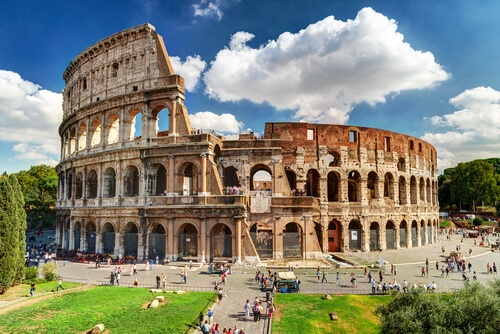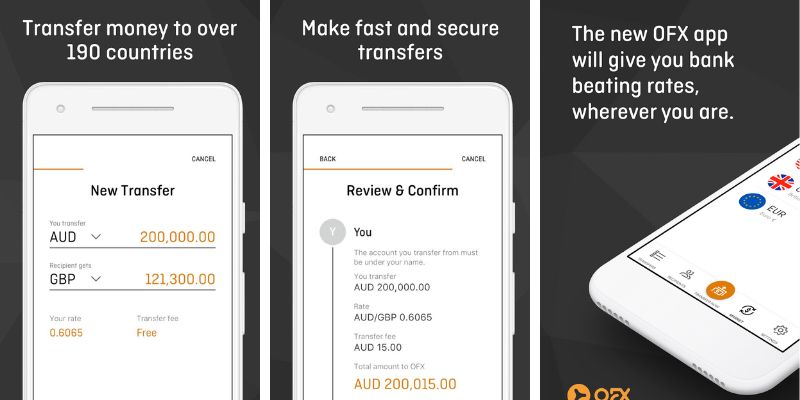How to buy property in Italy from US in 2026
Italy has a lot to offer – whether you love Italian culture, crave the local cuisine, or are simply looking for a mild Mediterranean climate to kick back in. But what about getting your own place there?
This guide covers all you need to know about buying property in Italy, including:
- Can an American buy a house in Italy?
- How to buy a place in Italy step by step
- Where to buy property in Italy, and how to find a perfect place
- What’s the property market like in Italy – and why is some property in Italy so cheap?
Making a high value purchase in a foreign currency – like buying a property overseas – can be costly and slow. In this article we’ll also talk about providers like Wise and OFX which can help you make cheap, fast and safe international transfers, with fees and rates that often beat the banks.
Key points: Buying real estate in Italy
- American citizens can buy a property in Italy without restrictions on nationality or residency.
- The most expensive city to purchase a property in Italy is Rome, and the cheapest is Palermo.
- Specialist money transfer providers like Wise and OFX can help you save money in transfer fees between the US and Italy.
- To purchase a property in Italy, you’ll need a codice fiscale to register your purchase and to open an Italian bank account.
- To purchase an Italian property, you’ll usually need to prove your identity and income or assets.
Can US citizens buy property in Italy? 🇮🇹
On to the most important question – can an American buy a house in Italy? Maybe you’re considering buying a second home in Italy, or a place for vacations for you and your family? Perhaps you want an investment – or maybe you’ve decided to move to Italy for keeps.
The good news is that Americans can buy property in Italy easily, with no restrictions on account of nationality or residency.
However, don’t forget that owning a home in Italy doesn’t exempt you from normal visa requirements – you’ll still need to make sure you have all required permits and paperwork depending on how long you expect to stay there.
What are the requirements to buy a house in Italy?
The requirements to buy a house in Italy are fairly similar to those in place when buying a property in the US. You’ll be asked to prove your identity, and will usually need to prove your income or assets, especially if you’re applying for a mortgage to finance the purchase.
The key local requirements aside from what you’ll probably be familiar with are getting a codice fiscale (like an SSN here in the US), and opening a bank account in Italy.
- A local bank account is usually needed to buy a property,
- and the codice fiscale will be needed to register your purchase. You can apply for a codice fiscale at the local Italian consulate in the US if you’re not in Italy already.
| Key point on international transfers for property purchases |
|---|
| When transferring money between the US and Italy, specialist money transfer providers like Wise and OFX can help you save significant amounts of money in transfer fees. For property related purchases this can get into the thousands of pounds. At Exiap we compare providers to help you find the best one for your needs. |

How to buy a home in Italy step by step
Buying a property – especially in a foreign country – can be a fraught process. You’ll need to make sure you have great local support on hand to guide you through the entire experience step by step. Luckily there are many realtors and property lawyers who have experience and expertise in supporting expats buying property in Italy, who can help.
Here’s an outline of the process you’ll likely need to follow:
- Find a property that’s right for you online, in person or through an estate agent
- Negotiate a selling price – this is easiest through an agent
- Engage a lawyer to complete property inspections and due diligence checks
- Prepare and agree a formal pre-sale contract with your real estate agent, lawyer or notary
- Make your deposit
- Sign the title deed in front of the public notary – you’re now the official owner
- Once you own your property in Italy you need to register the sale with the Italian Land Registry department
Italian property prices
Average house prices by square foot in Italy are marginally cheaper than in Spain, and far cheaper than other popular European destinations like France or the UK. Italy also offers a pretty amazing range of property types, from older villas to city apartments, which means there’s a great choice of price points.
How much does it cost to buy property in Italy? 2026
Let’s take a look at a snapshot of property prices by square foot from the cities we picked out earlier. This data comes from Numbeo – which takes live consumer data and aggregates it to come up with dynamic cost of living information for cities, regions and countries around the world.
| City | Price per square foot – city center | Price per square foot – outside of the city center |
|---|---|---|
| Rome | 741.99 USD | 338.91 USD |
| Florence | 520.25 USD | 332.13 USD |
| Milan | 844.98 USD | 448.20 USD |
| Bologna | 401.80 USD | 270.27 USD |
| Turin | 326.36 USD | 163.62 USD |
| Palermo | 163.09 USD | 107.77 USD |
*Information was updated on 4/12/2023
Don’t forget that as well as the property price, the final amount you pay could be influenced by the exchange rate you can get to convert your USD to euros to buy your Italian home. Banks often add a markup to the exchange rate they use to process international payments, which can mean you’re paying more than you need to, without even knowing it.Compare your bank against some specialist services before you move any money to buy your new home – you might find you get lower fees and a far better Euro exchange rate.
Here are a couple of popular options to consider:
- Wise – fast payments to 160+ countries in 50+ currencies, with discounts on fees for high value payments.
- OFX – international transfers you can arrange online, in app and by phone with competitive rates for higher value transfers.
1 euro properties in Italy
You may also have come across 1 euro houses in Italy, which receive a lot of publicity from time to time. This is really a pretty limited scheme, which allows Italian municipalities to support and facilitate the sale of properties which need significant investment, for just a euro.
The new owners take on most of the sale costs, and commit to complete a renovation project within a given time. Overall, the costs can be significant, as these are likely to be homes which need a lot of work. But if you love a project, and you want a historical home in Italy, this could be one to look into.

Best places to buy property in Italy
With so much variety, there’s no single best place to buy property in Italy. However, we can start to narrow down your search with some of the most popular cities in Italy for expats buying property. We’ll look at some of the cheaper options in just a moment – perfect if you want to experience life in Italy on a fixed income.
Rome
Rome is a natural draw as the capital of Italy – and the Eternal City with a wealth of culture, history, glorious cuisine and plenty of ways to entertain yourself. It’s also one of the most common cities to head to for work – with lots of jobs for English speakers across tourism and related industries, as well as a broad range of other business types. As with pretty much all capital cities, Rome is expensive – and house prices reflect this. However, it’s a large place, so there’s still a good variety of housing options at a variety of price points.
Florence
Florence, in the popular Tuscany region of Italy, is perennially popular for its impressive culture and history. It’s got a fairly large and established expat community, so you’ll be able to find like minded people fairly easily. As you might expect, property in Florence is quite pricey – outside of the city center house prices by square foot rival those in Rome – but city center apartments in Florence are often available at more accessible prices compared to Rome, making this a good option if you want a slice of city life.
Milan
Milan is another fabulous Italian city with great opportunities for work, play, and family life. There’s a big expat community, as Milan is home to lots of large global businesses, particularly in the finance industries. That in turn means there are plenty of services for expats, like international schools and English speaking healthcare options. As in all Italian cities, there’s no shortage of things going on – whether you love to shop, or want to escape the city to get out and about, you’ll be able to find what you need in Milan.
| Getting a bank account in Italy |
|---|
| Getting a multi currency account can help you easily manage your money and save on fees. You can use the account to receive, hold, and transfer different currencies, as well as to spend on a debit card. Wise and Revolut are some of the most popular providers for multi-currency accounts. |
Best ways to pay for the property purchase
When buying a property, it’s inevitable that large amounts of money will be exchanged, making it vital that all transfers are made quickly, safely, and cost-effectively, especially when purchasing abroad. Here are three US providers offering reliable, high-value transfer services.
Wise
Wise is an online provider that allows customers to hold over 40 currencies in its free multi-currency account and send payments to over 160 countries. It stands out thanks to its low and transparent fees that start at 0.43% and its use of the mid-market exchange rate, with no hidden fees.
For example, if you want to send 100,000 USD to Italy, this would incur an average fee of 0.49% or 491.76 USD. A transfer of 100,000 USD would get you 90,786.34 Euros based on a mid-market exchange rate of 0.912350. (in December 2023)
Wise also offers a single-use fee-free transfer, which either removes or reduces the fee on your first transfer, regardless of the currency, when you’ve been invited by someone who already uses Wise. You can also send up to 1,600,000 per Swift transfer, making it an attractive option for large transfers.
OFX
OFX is a great choice for large-sum international transfers, offering competitive exchange rates and flexible transfer options.
For example, transferring 100,000 USD would get you a total of 90,980 Euros based on a customer rate of 0.9098. (in December 2023)
Unlike other providers, OFX doesn’t impose a maximum limit on transfers, allowing customers to send anywhere up to 2 Billion USD fee-free, making it a go-to platform for large property purchases. However, transfers under 10,000 USD do incur a small standard fee of 15 USD. OFX also gives you the option to lock-in exchange rates for up to 12 months and Limit Orders to make the most of favorable rate fluctuations.
Capital One
Capital One is a well-known financial institution in the United States offering a wide range of services. Online wire transfers incur a fee of 30 USD, and their daily transfer limits include 500,000 USD to title companies and 50,000 USD for personal transfers.
Capital One’s international wire transfers can be initiated in person via a bank branch, over the phone or online through their website or app. While they have a sender fee, their extensive banking services and reputation also makes them another reliable choice for transferring large sums internationally.
Cheapest places to buy property in Italy
We’ve started with the top picks for large Italian city life – but these tend to come with a fairly high price tag, so let’s move on to some slightly cheaper destinations. Wherever you look in Italy the chances are that you’ll find a good range of housing price points – but these are some good starting options if your budget is limited.
Bologna
Bologna still offers great city living, but with a price tag for housing that’s around half of the cost of Milan on average. It’s a manageable sized place, with a lively university scene which means there’s lots of entertainment, and plenty to get involved in.
Turin
Turin is frequently picked out as one of the best cities in Italy, and yet has pretty low house prices compared to many other locations. It’s not a huge place, which makes getting around easy, and it’s also pretty simple to get out of the city into nature for those who want to explore on a wider scale.
Palermo
Palermo in Sicily is one of the cheaper places to buy a property in Italy, but offers a fascinating look at life on an Italian island. You’ll not find such a large expat community, and English may not be as widely spoken as it is elsewhere on mainland Italy, but for Americans looking for an Italian adventure, this could be a dream.
Is buying a house as an investment in Italy a good idea?
Buying a property anywhere in the world comes with some risks – so you’ll want to seek individual advice before you decide to buy a place in Italy as an investment. House prices can change significantly, so whether or not it’s a good idea to invest will depend a lot on what type of property you’re interested in, what price you can negotiate, and how long you’re likely to hold the investment.
In general terms, house prices in Italy fell significantly during and in the aftermath of the 2008 financial crisis, but have been steadily climbing over the past couple of years. That could mean you can pick up a place which works well as an investment if you’re lucky.
What’s the property market like in Italy?
The Italian property market has been steadily improving over the past couple of years, despite a bump in the road due to the global pandemic, and changes to Italy’s property tax laws. While prices vary enormously by region and city – as we’ll see below in our side by side comparison of prices in a few key cities – average housing costs were on the up in 2022 and 2023.
The overall outlook for property prices in Italy and more broadly in Europe for 2024 is subject to significant debate, as it is unclear how increases in local and regional inflation, and the impact of war in Ukraine will influence consumer confidence and market stability.
Can you buy property in Italy as an American expat?
The good news is that American expats can easily purchase property in Italy, and the Italian real estate market is open to foreigners, including US citizens.
For citizens of the European Union (EU) and the European Economic Area (EEA), the process of buying a home in Italy is straightforward, giving them the same rights as Italian citizens. However, for nationals outside of the EU and EEA, purchasing a property is dependent on either obtaining a valid residence permit or coming from a country with reciprocal international agreements. The United States has this agreement with Italy, allowing its citizens to purchase property in Italy and vice versa without the need for special documents or higher taxation.
Tips on purchasing real estate in Italy
- Research the market thoroughly: Before committing to a property, it’s important to have a thorough understanding of the Italian real estate market, including market trends and regional variations in price.
- Research different areas: Explore various regions and types of property throughout the country first. You could even consider renting first to check infrastructure and local amenities like transport links, schools, and shops to ensure that you like the area and help you make an informed decision.
- Get local help: Hiring the services of local experts, such as local estate agents and lawyers, will provide valuable insights to the region you’re looking to buy in as well as overcoming language barriers and ensuring that all legal requirements are met.
- Plan for additional costs: If you’re thinking of buying a property that’s in need of renovation, make sure to budget for additional costs beyond the purchase price, including agency and legal fees.
Financing a property purchase in Italy
How you pay for your new Italian property will depend on your personal situation. You might decide to:
- Buy in cash using your savings
- Get a mortgage in Italy through a bank or broker
- Get a mortgage or loan in the US, and use it to finance your Italian home
Whichever route you think you’ll take it’s worth getting professional advice to help you decide which option might suit you.
If you travel to Italy often, this guides can be helpful: Best travel cards for Italy and Best ways to take money to Europe
Getting an Italian mortgage
There’s no legal reason why Italian banks can’t offer mortgages to foreigners buying a home in Italy. However, some banks choose not to offer this service – and some may offer mortgages to foreigners, but only with a fairly low loan to value (LTV) which could be around 50% – 60%. That would mean you’d need to pay a high deposit of 40% – 50% on the value of the property to unlock the mortgage.
Shop around to see whether you’re eligible for an Italian mortgage which suits your needs. A broker or specialist in expat properties may be able to help connect you with some providers which are more experienced in working with Americans buying property in Italy, which can make the process smoother.
Paying property tax in Italy
Don’t forget – when you buy a house in Italy there will also be some other fees, taxes and costs to build into your budget. The end to end house buying process in Italy is considered to be moderate to high, with costs mainly being picked up by the buyer, which can include:
| Cost type | Average % fee |
|---|---|
| Registration tax | 3% – 7% |
| Value added tax | 4% – 22% |
| Land Registry tax | 1% |
| Notary fee | 1% – 2.5% |
| Legal fees | 1% – 2% (+ 22% VAT) |
| Realtor fee | 1.5% – 4% (+ 22% VAT) |
| Total average paid by buyers | 9.05% – 32.82% |
How to buy land in Italy
Buying land in Italy is an attractive option for those who want to build a brand new custom home from the ground up. However, it’s important to note that building plots are often expensive due to their development potential, and the cost will depend on the location and municipality. While the process can be rewarding, it’s crucial to be well-informed and have local, professional support, like real estate lawyers, to guide you through the process and eliminate risks.
Here are some of the steps involved when it comes to buying a plot of land:
- Identify potential building plots that are suitable for construction.
- Consult the building index of the area to determine how much you can build per square meter of plot.
- Carry out a geological survey to determine the soil quality, land stability, etc.
- Work with a real estate lawyer to negotiate and agree on a price and finalize your purchase.
- Apply for a building permit at the Sportello Unico dell’Edilizia in your chosen municipality.
- Once you’ve received your building permit, you’re free to start building your new home.
| International transfers for land purchases |
|---|
| Purchasing land will cost thousands to hundreds of thousands of dollars and will require transferring a significant amount of money from the US to Italy. Consider using specialist money transfer providers like Wise and OFX to save you money on exchange rates and fees. At Exiap, we compare providers to help you find the best option for all your needs. |
To compare providers, you can check this page: Send money to Italy
How easy is buying property in Italy for foreigners?
Buying a property in Italy shouldn’t be too tricky. However, it’s important to make sure you have solid local support and advice to help you navigate the process.
While many things about buying a property in Italy may be familiar, there are some key differences – and some potential pitfalls if you’re not prepared. For example, construction standards, particularly in older and more rural properties, may not be the same as in the US, making due diligence checking all the more important.
Get a good realtor, and lawyer to help you – and make sure you’re fully aware of all the details of the transaction before you sign.
If you are interested in buying property abroad, you can also check out our other guides:
- How to buy property in Japan
- How to buy property in France
- How to buy property in Thailand
- How to buy property in Spain
How to find a Italy property
Find a property in Italy online, in person, or through your own personal network. There are some great umbrella websites which offer lots of properties throughout Italy, and which are easily searchable by location or keyword. This can be a perfect way to build up a picture of the type of property you may like – or what’s available at your budget.
Once you’ve done your basic research it’s worth getting a realtor on board who can support you with your search – particularly if you can’t be in Italy yourself.
Websites to buy property in Italy
Ready to dive into your Italian property search? Start with these great websites to get some inspiration.
Conclusion on How to Buy a Property in Italy
Buying a property in Italy as a US citizen or resident shouldn’t be too tricky. However, the process won’t be exactly the same as buying a place in the US, so you’ll need to get local support lined up before you hand over any money or make any commitments.
Getting your new home in Italy is exciting. But making a high value purchase in a different country and currency can be costly. Save money by using providers like Wise and OFX to buy your new home with a fast, cheap and secure international transfer, with good exchange rates.
FAQs on Buying Property in Italy
Can US citizens buy property in Italy?
Yes. US citizens can buy property in Italy with no restrictions. However, buying a property in Italy doesn’t automatically give you the right to live in Italy. You may still need a visa or permit depending on how you intend to use your new home.
How much deposit do you need to buy a property in Italy?
The amount of deposit you need to pay will be negotiated as part of your pre-sale contract. 5% to 10% is often the negotiated agreement.
Related: Where to buy euros in the US
Is Italy a good country to buy property?
Italy’s property market has seen steady growth since crashing during the financial crisis of 2008. There’s a great range of property types on offer, across some beautiful cities and more rural locations – making it an attractive destination for Americans looking to buy a place abroad.


